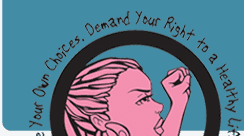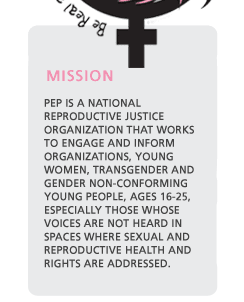In the United States, a culture of ableism, which maintains that able-bodied people are superior and most valuable, prevails. In this culture, disability is feared, hated, and typically regarded as a condition that reduces the value of disabled people. The reproductive justice framework helps us understand how eugenic "science" is still a vibrant part of U.S. culture that interacts with and shapes the reproductive lives of disabled women in many ways.
Right to Parent
Women with disabilities (WWD) have a long history of forced sterilization, are often seen as "unfit" mothers and are discouraged from having children, or not allowed to adopt children. Authorities press disabled women to feel guilty for their decisions to be parents, pointing out that their decision will take a "toll" on their children, families, communities and on themselves.
Sexuality
Society typically defines disabled women as asexual and as dependent on able-bodied people, undermining these women's access to reproductive health. Disabled women and girls often do not receive sex and reproductive health education. Health care providers may fail to ask WWD about their sexual lives, conduct full pelvic exams or screen WWD for STD/HIV, because it is assumed that these women do not have sex, or that they should not have sex. Because disabled women are seen as possessing less than "valuable" or "functional" wombs to carry children, their reproductive health may go unchecked and uncared for. WWD, a group with pathologized bodies, have the right to receive care and also the right to refuse it.
Access to Services
Women with disabilities have limited access to health care services and information. WWD may not have access to suitable transportation (mass transit, use of a wheelchair- accessible automobile). Clinic facilities may be inaccessible (lacking ramps, Braille, sign language interpreters, equipment). Reproductive health information may not be accessible to WWD due to issues surrounding language and interpretation, isolation due to the level of stigma still associated with most forms of disabilities, dependency on care givers, and limited access to other WWD. Disability and class also may limit WWD's access to computers, communication devices, or mobility equipment. Women with mental disabilities also encounter barriers when it comes to accessing reproductive health services: they may be institutionalized, vilified as drug users and addicts. These women may not be allowed to have a role in decisions regarding their reproductive health and their bodies.
Sexual Violence
Violence against disabled women and girls is very common. Power imbalance and isolation can create special vulnerability (domestic violence, sexual assault, abuse) for disabled women dependent on caregivers. Caregivers (partners, nurses, family members, doctors) may withhold medication, medical care and information, or transportation as an expression of power and control.
Eugenics/Population Control
The continuing power of eugenic thought in the U.S. justifies population control measures for WWD and disabled children. The medical establishment pathologizes "disabling traits," associates these traits with "social problems," and defines them as targets to "cure" and "conquer." Disabled women have been routinely sterilized or maintained on birth control, such as Depo-Provera which stops periods and prevents conception. These practices have been convenient for care givers and institutions. While traditionally the project of wiping out disability has centered on eliminating disabled bodies, today, Inheritable Genetic Modification (IGM), aims to modify the human gene pool to exclude genes that cause (or might cause) various disabilities.
The use of Prenatal Diagnostics (ultrasounds and amniocentesis) to deselect and abort fetuses with disabilities (down syndrome, spina bifida, muscular dystrophy, sickle cell anemia and many more), illustrates the deeply entrenched ableism among women and the culture-at-large. While many pro-choice TAB feminists argue for the right to abortion, many disabled feminists question the inherent ableism that surrounds the decisions to abort.
The framework of reproductive justice provides an analysis grounded in human rights and collective social justice. "Justice," rather than "right to privacy," allows for a broader analysis and more complicated approach to the politics and challenges surrounding WWD and reproductive justice. For many WWD, the right to privacy is not a privileged experienced in relation to one's body. Disabled women and girl's bodies have long been invaded and seen as the property of the medical industry, doctors, the state, family members, and care givers. The goal should not be to "cure the world of disabilities"' or to do away with disabled people. The goal should be to work for communities that provide accessible opportunities and resources, human rights, and reproductive justice for WWD.
Resources
- www.genetics-and-society.org/
- www.worldenable.net/women/default.htm
- http://disabilitystudies.syr.edu/resources/motherhood.aspx
- www.crlp.org/pdf/pub_bp_disabilities.pdf
- www.disabilityhistory.org/dwa/edge/curriculum/
- http://hrw.org/women/disabled.html
- www.disabilityhistory.org/dwa/index.html
- Shelly Tremain, Bio-Politics, and the Government of Impairment in Pregnancy, Hypatia, 2006
- Rickie Solinger, ed., AbortionWars: A Half Century of Struggle, 1950-2000, Berkeley: University of California, 1998
- Eric Parens and Adrienne Asch, PrenatalTesting and Disability Rights, Georgetown University Press. 2000.
- U.S. Disability Authors: Adrienne Asch, Marsha Saxton, Anne Finger, Laura Hershey, Mary Johnson, Deborah Kaplan, Peg Nosek, Carol Gil, Lisa Blumberg, Anita Silvers, Debra Kent, Simi Linton.
|






